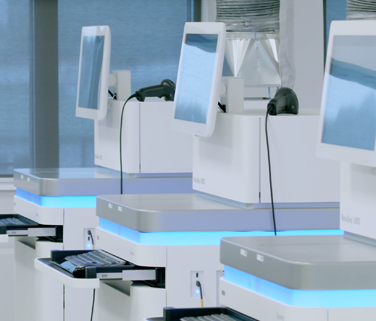Summary:
- Amgen is using omics—the study of biological data from genes, RNA and proteins—to understand the molecular basis of health and disease.
- Amgen’s subsidiary, deCODE genetics, has some of the most extensive collaborations with groups worldwide to study omics data with the goal of discovering disease risk factors and how they translate into disease mechanisms.
- Integrating genomics, transcriptomics and proteomics is helping Amgen prioritize drug targets and design more effective medicines tailored to individual patients.
Despite advances in medicine, key questions remain: Why do some develop diseases while others don’t? Why does a treatment work for one patient but not another? How can we predict which medicines may be most effective before initiating clinical trials?
Amgen is using omics—the large-scale study of biological data—to help answer these questions and understand health and disease. By integrating genomics (DNA), transcriptomics (RNA) and proteomics (proteins) research, Amgen aims to redefine drug discovery, accelerate development and deliver more effective targeted treatments to patients faster than ever before.
Using Omics to Drive Drug Discovery
Amgen’s approach to drug discovery has always been rooted in human biology, with the recognition that understanding genetics—how variations in DNA contribute to disease—could transform drug development. But genes tell only part of the story. Deeper insights come with the integration of multiple layers of biological human data.
- Genomics reveals inherited disease risk and helps discover drug targets.
- Transcriptomics shows how genes are activated or suppressed in disease and treatment.
- Proteomics provides dynamic insights into disease progression and treatment effects at the molecular level.
“A central goal is to harness human data at population scale to understand complex disease and to direct the discovery of medicines,” said Jay Bradner, Executive Vice President of Amgen R&D. “Integrating human genetic variation with clinical outcomes provides unprecedented insights into the cause of disease and, importantly, targets which might offer protection.”
From Data to Breakthroughs
Amgen deCODE genetics, a global leader in human genomics based in Iceland, has some of the most extensive collaborations with groups worldwide to study omics data. This allows Amgen to discover genetic risk factors for diseases like cardiovascular disorders, cancer, autoimmune and rare diseases. Integrating transcriptomic and proteomic data helps scientists understand how these genetic factors translate into disease mechanisms.
“We are committed to harnessing human genetics and other omics insights to deepen scientific understanding and deliver tangible benefits for patients through precision-targeted therapeutics,” said Unnur Thorsteinsdottir, co-managing director of Amgen deCODE genetics.
For example, the team collaborated on a genome-wide study of 30,000 patients with autoimmune thyroid disease (AITD) and over 725,000 controls in Iceland and the UK. The disease is common, often inherited, and mainly associated with hypothyroidism, or low thyroid function, when immune cells attack the thyroid gland.
The team discovered a relatively rare variant in the FLT3 (fms-like tyrosine kinase 3) gene that codes for a receptor on immune and blood cells essential for cell growth. They found that people with this DNA variant are at higher risk for autoimmune diseases like AITD, systemic lupus erythematosus (SLE), or lupus, rheumatoid arthritis, celiac disease and nearly double the risk for acute myeloid leukemia (AML).
The team examined participants' transcriptomes, or RNA (the intermediary between a gene and the protein that gene makes), and found that the variant altered the FLT3 gene, resulting in an inactive FLT3 receptor. This is known as a loss of function variant.
Finally, studying the proteome, or proteins, the team found that participants with the variant had increased FLT3 ligand protein levels in their blood. This unexpectedly heightened FLT3 activity, revealing that the loss-of-function variant actually boosted FLT3 signal through an increase in its ligand levels, leading to the development of blood cells involved in AML and autoimmune diseases. Amgen is currently researching the potential of blocking FLT3 signaling in certain autoimmune diseases.
Studies like these improve understanding of disease biology, leading to more conviction in potential targets.
A New Era of Precision Medicine
Integrating omics data into drug development is also reshaping the future of precision medicine. Rather than a one-size-fits-all approach, scientists are now designing treatments that can bring more tailored options to patients.
Take cardiovascular disease, for example. Traditional treatments target broad populations, but many patients still suffer from heart attacks or strokes despite receiving standard care. Using omics, Amgen is developing potential therapies that target specific genetic and protein markers linked to cardiovascular risk—bringing new hope to patients who need more options.
Surfaceomics, a growing field of omics, focuses on discovering new targets on cell surfaces to develop better treatments, particularly for cancer. Amgen scientists are exploring ways to better understand these cell surface molecules, their modifications and their interactions. One promising strategy is dual targeting, where a therapeutic molecule binds to more than one target specific to the surface of tumor cells. This may enhance a therapy’s precision and effectiveness, while reducing harm to healthy cells.
Omics is also helping scientists match the right therapies to the right patients by discovering biomarkers, or molecular signatures, of diseases such as cancers. This ensures that patients receive the most effective treatments, while avoiding unnecessary side effects.
For patients, the impact of omics could be profound. It could mean treatments that are more effective from the start and fewer failed therapies. Instead of settling for trial-and-error, medicine is becoming more predictive and personalized. “We translate the knowledge derived from omics data into insights at different stages of research and development, from target identification to trial design,” said Patrick Sulem co-managing director of Amgen deCODE genetics.
Amgen leverages expertise in human biology to drive the next wave of medical innovation. Investing in omics is not just helping to discover new medicines, it’s enhancing the understanding of disease mechanisms and expanding treatment options for patients in need.






